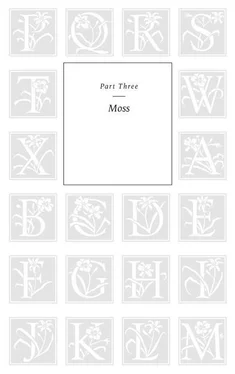Vanessa Diffenbaugh - The Language of Flowers
Здесь есть возможность читать онлайн «Vanessa Diffenbaugh - The Language of Flowers» весь текст электронной книги совершенно бесплатно (целиком полную версию без сокращений). В некоторых случаях можно слушать аудио, скачать через торрент в формате fb2 и присутствует краткое содержание. Жанр: Старинная литература, на английском языке. Описание произведения, (предисловие) а так же отзывы посетителей доступны на портале библиотеки ЛибКат.
- Название:The Language of Flowers
- Автор:
- Жанр:
- Год:неизвестен
- ISBN:нет данных
- Рейтинг книги:4 / 5. Голосов: 1
-
Избранное:Добавить в избранное
- Отзывы:
-
Ваша оценка:
- 80
- 1
- 2
- 3
- 4
- 5
The Language of Flowers: краткое содержание, описание и аннотация
Предлагаем к чтению аннотацию, описание, краткое содержание или предисловие (зависит от того, что написал сам автор книги «The Language of Flowers»). Если вы не нашли необходимую информацию о книге — напишите в комментариях, мы постараемся отыскать её.
The Language of Flowers — читать онлайн бесплатно полную книгу (весь текст) целиком
Ниже представлен текст книги, разбитый по страницам. Система сохранения места последней прочитанной страницы, позволяет с удобством читать онлайн бесплатно книгу «The Language of Flowers», без необходимости каждый раз заново искать на чём Вы остановились. Поставьте закладку, и сможете в любой момент перейти на страницу, на которой закончили чтение.
Интервал:
Закладка:
An hour passed. Still swooning from the unexpected glimpse of my baby girl, I heard Grant’s boots approach from behind me. My heart echoed as it had in the flower market the first time we met, and I pulled my knees to my chest as if to muffle the sound. Grant lined his boots up with my own and sat down next to me, his shoulders touching mine. He tucked something behind my ear, and I withdrew it. A white rose. I held it up to the sun, and its shadow fell upon us. We sat in silence for a long time.
Finally, I slid away and turned to him. It had been more than a year since I’d seen Grant, and he seemed to have aged more than the time should have allowed. Thin lines etched across his serious brow, but his strong soil scent was as I remembered. I inched myself back until our shoulders touched again.
“What’s she like?” I asked.
“Beautiful,” he said. His voice was quiet, thoughtful. “Shy at first, usually. But when she’s ready, when she reaches for you and holds both your ears with her fat little hands, there’s nothing like it in the world.” He paused for a moment, pulling a petal from the rose I held and holding it to his lips. “She loves flowers, too, picks them, smells them, will eat them if you don’t watch her closely enough.”
“Really?” I asked. “Loves them like we do?”
Grant nodded. “You should see the way she smiles when I rattle off the names of the orchids in the greenhouse: oncidium, dendrobium, bulbophyllum , and epidendrum , tickling her face with each blossom. I wouldn’t be surprised if ‘Orchidaceae’ was her first word.”
I pictured her round face, cheeks flushed from the heat of the greenhouse, pressed into Grant’s chest to avoid the tickling flowers.
“I’m trying to teach her the science behind the plants, too,” Grant said. The smile that stretched his lips was full of memory. “But so far it’s not going so well. She falls asleep when I start to ramble on about the history of the Betulaceae family or the way moss grows without roots.”
Moss grows without roots . His words took my breath away. Throughout a lifetime studying the biology of plants, this simple fact had eluded me, and it seemed now to be the one fact I needed, desperately, to have known.
“What’s her name?” I asked.
“Hazel.” Reconciliation . Grant pulled at a stubborn root of crabgrass, avoiding my eyes. “I thought, someday, she’d bring you back to me.”
She had, in this moment, brought us back together. The root of the crabgrass popped loose. Grant followed the dry shoot to the point of its next engagement with the earth.
“Are you mad?” I asked.
Grant didn’t answer for a long time. Another root broke free, and he pulled up the entire plant, twisting the long strand of grass around his thick index finger. “I should be.”
He was quiet again, looking out over his property. “I’ve rehearsed my anger a hundred times since discovering Hazel. You deserve to hear me out.”
“I know I do,” I said. “Go ahead.” I looked at him, but he didn’t meet my gaze. He would not deliver the words he’d practiced. Though he had every right to be, he wasn’t angry, and didn’t want to make me suffer. It wasn’t in him.
After a time, Grant shook his head, exhaling. “You did what you had to do,” he said. “And I did what I had to do.”
I understood his words to mean that I was right when I’d guessed my daughter lived on the vineyard; Grant had given her to Elizabeth.
“Dinner?” Grant asked suddenly, turning back to me.
“Are you cooking?” I asked.
He nodded, and I stood up.
I started toward the water tower, but Grant took my hand and led me to the front porch of the main house. I let him guide me, noticing for the first time that the house had been repainted and the windows replaced.
The dining room table was set, the long, polished wood exposed except for two placemats on one end, folded cloth napkins, polished silver, and thin white china plates with indistinguishable blue flowers ringing the edge. I sat down, and Grant poured water into a crystal glass from a pitcher before disappearing through the swinging door that led to the kitchen. He came back with a whole roasted chicken on a silver platter.
“You cook this much for yourself?” I asked.
“Sometimes,” he said. “When I can’t get you out of my head. But today I cooked it for you. When I saw you jump the fence, I turned on the oven.”
He removed both drumsticks with a knife and placed them on my empty plate before slicing the breast. From the kitchen, he retrieved a boat of gravy and a long tray of roasted vegetables: beets, potatoes, and peppers in vibrant colors. While he served me vegetables, I finished sucking the meat off the bones of the first drumstick. I set the clean bone down in a pool of gravy, and Grant took his seat in the chair opposite mine.
I had so many questions. I wanted him to describe every day that had passed since he discovered the baby in the moss-lined basket. I wanted to know how he felt when he looked into his daughter’s eyes for the first time, if he felt love or terror, and how she came to live with Elizabeth.
I wanted to ask, but instead I ate the chicken, ferociously, as if I had not had a meal since the last time Grant cooked for me. I ate both drumsticks and both wings and started on the breast. The taste of the meat was entwined in my memory with the taste of Grant, his kisses after cooking, the way he touched me, only when I asked, in the studio and in all three stories of the water tower. I had left him, and his touch, and his cooking, and nothing, ever, had replaced it. When I looked up, he was watching me eat, as he had done so many times before, and I could tell by the look in his eyes that nothing had replaced me, either.
When I finished eating, the chicken on the silver platter was a statue of bones. I looked at Grant’s plate. It was hard to tell if he’d eaten anything. I hoped so. I hoped I hadn’t devoured the entire bird. But when he asked me if I wanted to see Hazel’s room, and I tried to stand up, I felt the weight of the meat inside me. I let Grant half-carry me up the stairs. He opened the last door in the long hallway and helped me to the edge of a twin bed. I lay down. Grant picked up my head and placed a pillow beneath my neck. He crossed in front of a rocking chair and pulled a pink leather scrapbook off a bookshelf.
“Elizabeth made this for her,” he said, opening the book. The first page held a picture of a hazel blossom that Catherine had drawn. It had been pulled from its file, laminated with clear plastic, and secured to the album with gold photo corners. Below the drawing was my daughter’s name, Hazel Jones-Hastings, in Elizabeth’s elegant script, and her birthday, March 1, which wasn’t her birthday at all. He turned the page.
In a mounted photograph, Hazel lay in her moss-lined basket, exactly as I had left her. It made my stomach churn, my eyes well, to remember my love for her in that moment, overwhelming and incapacitating. On the next page, Hazel’s head pressed against Grant’s chest in a baby carrier, a floppy white hat tied under her chin. She was asleep. There were two or three photos from each month of her life, her first smile and first teeth and first food all captured with loving attention.
I closed the book and handed it back to Grant. It was everything I had wanted to know.
“This is her room?” I asked.
“When she visits,” he said. “Saturday afternoons, usually, or after the farmers’ market on Sundays.” He ran his hand along the railing of an empty crib as he returned the photo album to its shelf. When he lay down next to me, his body was hot where it touched my arm.
I looked around the room. Catherine’s floral drawings, one-foot graphite squares, hung in thick white mats with pink wooden frames. The frames matched the pink furniture: the crib, a rocking chair, a nightstand, and a bookshelf, all stenciled with white daisies.
Читать дальшеИнтервал:
Закладка:
Похожие книги на «The Language of Flowers»
Представляем Вашему вниманию похожие книги на «The Language of Flowers» списком для выбора. Мы отобрали схожую по названию и смыслу литературу в надежде предоставить читателям больше вариантов отыскать новые, интересные, ещё непрочитанные произведения.
Обсуждение, отзывы о книге «The Language of Flowers» и просто собственные мнения читателей. Оставьте ваши комментарии, напишите, что Вы думаете о произведении, его смысле или главных героях. Укажите что конкретно понравилось, а что нет, и почему Вы так считаете.












